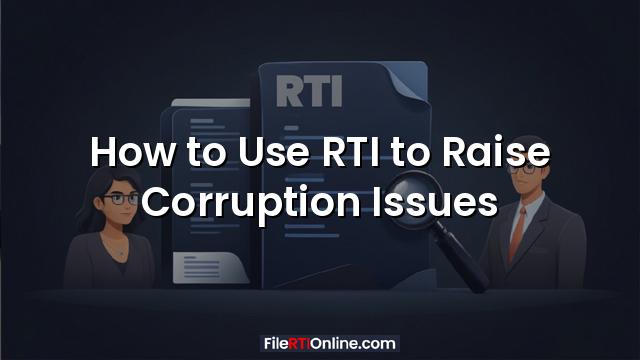The Right to Information (RTI) Act is often seen as a tool for obtaining documents and data from public authorities. However, one of its strongest but lesser-known purposes is its role in exposing corruption and ensuring accountability. Even when a department is exempt from the RTI Act under Section 24, information linked to corruption cannot be withheld.
This article explains how you can use RTI to raise corruption-related issues, and illustrates the principle with an actual decision of the Central Information Commission (CIC) involving the Income Tax Department.
Why RTI Is a Powerful Tool Against Corruption
The RTI Act includes a clear exception under Section 24, which exempts certain intelligence and investigative bodies from the Act. However, the proviso to Section 24(1) states:
Information relating to allegations of corruption or human rights violations cannot be denied, even organisations.
This means that if a citizen believes that an officer has acted with bias, misconduct, favoritism, or corruption—and can show some basis for that belief—the RTI Act still applies.
Using RTI to Highlight Corruption: What You Can Ask
You can file an RTI application in corruption-related matters to:
- Ask why a benefit, payment, or reward was denied
- Question unexplained delays
- Seek reasons for decisions that appear arbitrary
- Request file movement details
- Ask for certified copies of guidelines or criteria used in decisions
- Request details of internal procedures or compliance failures
Even if the authority is normally exempt, the proviso ensures transparency when corruption is alleged.
Case Example: RTI to Address Non-Payment of Reward in Income Tax Department
To understand how this works in practice, let’s look at a real CIC case.
Background of the Case
An individual had provided valuable information to the Income Tax Department, leading to successful searches in 2004. As per the reward rules:
- He had already been paid ₹14.8 lakh
- He believed he was entitled to an additional ₹10 lakh
- Despite repeated reminders, the remaining reward was not released
He filed an RTI application asking why the balance amount was withheld.
PIO’s Response: Claim of Section 24 Exemption
The Public Information Officer stated that the office of the Directorate General of Income Tax (Investigation) is listed under Section 24 and therefore exempt from RTI.
The PIO refused to give any information.
What Happened Before the CIC
During the hearing:
Applicant’s Argument
- His reward was being unfairly withheld.
- The delay was due to corruption and misconduct .
- Therefore, the matter fell under the corruption exception to Section 24.
Respondent’s View
- The office is exempt.
- No information could be disclosed.
CIC’s Decision: A Clear Affirmation of RTI in Corruption Cases
The CIC ruled:
1. Section 24 exemption does not apply where corruption is alleged
The Commission confirmed that the proviso under Section 24(1) overrides the exemption:
If allegations of corruption are involved, information cannot be denied.
2. CBDT must conduct an internal inquiry
The case was remanded to the Chairman, CBDT, who was directed to:
- Examine the applicant’s claim
- Conduct internal verification
- Take appropriate action based on findings
3. RTI can trigger official action even if information is not directly released
CIC recognized that the applicant sought not just documents, but accountability.
What You Can Learn from This Case
1. Use the corruption proviso strategically
If you believe an action is tainted , explicitly assert this in your RTI.
A simple line such as:
“This request pertains to allegations of corruption; therefore Section 24 exemption does not apply.”
…forces the department to justify its denial.
2. Provide a factual basis
Giving dates, copies of communications, and references to guidelines strengthens your claim.
3. Even exempt departments must act
They may not provide documents, but they must:
- Conduct inquiries
- Justify decisions
- Report findings to higher authorities
4. CIC can order action
The Commission can direct internal investigations if corruption issues arise.
Conclusion
RTI is not just a tool to access files—it is an instrument of accountability. Even agencies protected under Section 24 must respond when corruption is alleged. The case involving non-payment of the Income Tax reward illustrates that the CIC will intervene when a citizen’s claim highlights possible misconduct.


